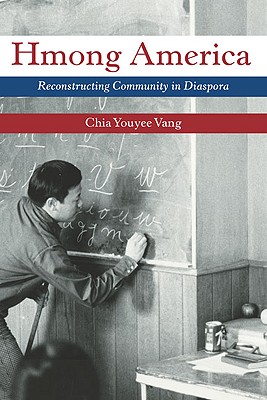- Asian American Studies
- >
- Southeast Asian American Studies
- >
- Hmong America: Reconstructing Community in Diaspora
Hmong America: Reconstructing Community in Diaspora
SKU:
9780252077593
$25.00
$25.00
Unavailable
per item
Author: Chia Youyuee Vang
ISBN 13: 9780252077593
Publisher: University of Illinois Press
Publication Date: 2010
Format: Paper
Condition: New
ISBN 13: 9780252077593
Publisher: University of Illinois Press
Publication Date: 2010
Format: Paper
Condition: New
The first scholarly work to come from inside the Hmong community, Hmong America documents Chia Youyee Vang's own migration from Laos to Minnesota at age nine and the transformations she has witnessed in Hmong communities throughout the migration and settlement process. Vang depicts Hmong experiences in Asia and examines aspects of community building in America to reveal how new Hmong identities have been formed and how they have challenged popular assumptions about race and ethnicity in multicultural America.
With an approach that intermingles the archival research of a historian, the personal experiences of a refugee, and the participant-observer perspectives of a community insider, Vang constructs a nuanced and complex portrait of the more than 130,000 Hmong people who came to the United States as political refugees beginning in the mid-1970s. She offers critiques of previous representations of the Hmong community and provides the sociological underpinnings for a bold reassessment of Hmong history in the greater context of globalization. This new understanding redefines concepts of Hmong homogeneity and characterizes ordinary Hmong migrants not as passive victims but as dynamic actors who have exercised much power over their political and social destinies.
While Vang focuses on the Hmong community in the Twin Cities, she also has conducted research in numerous Hmong enclaves in the United States and abroad. In addition to recounting historical events, she incorporates the voices of those who personally experienced and informed the development of ethnic and faith-based traditions, political mobilization around unequal treatment of Hmong Americans, and changing aesthetics and cultural politics regarding ethnic celebrations.
With an approach that intermingles the archival research of a historian, the personal experiences of a refugee, and the participant-observer perspectives of a community insider, Vang constructs a nuanced and complex portrait of the more than 130,000 Hmong people who came to the United States as political refugees beginning in the mid-1970s. She offers critiques of previous representations of the Hmong community and provides the sociological underpinnings for a bold reassessment of Hmong history in the greater context of globalization. This new understanding redefines concepts of Hmong homogeneity and characterizes ordinary Hmong migrants not as passive victims but as dynamic actors who have exercised much power over their political and social destinies.
While Vang focuses on the Hmong community in the Twin Cities, she also has conducted research in numerous Hmong enclaves in the United States and abroad. In addition to recounting historical events, she incorporates the voices of those who personally experienced and informed the development of ethnic and faith-based traditions, political mobilization around unequal treatment of Hmong Americans, and changing aesthetics and cultural politics regarding ethnic celebrations.

